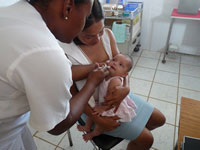Rotavirus vaccine could save lives in poor countries
July / August 2010 | Volume 9, Issue 4
Rotavirus vaccines are effective in the developing world and introducing vaccines in these settings could substantially decrease childhood mortality from diarrheal diseases, according to a
Lancet commentary co-authored by Fogarty’s director. About 500,000 children die from rotavirus every year, with 85 percent of those occurring in low-income countries.

Photo courtesy of WHO
Introducing rotavirus vaccines in the
developing world could reduce the
number of deaths by 25 percent,
according to articles published in
the
Lancet.
Vaccines could reduce deaths by as much as 25 percent, according to Dr. Roger I. Glass and his co-author, Dr. E. Anthony S. Nelson of the Chinese University of Hong Kong. Introducing these vaccines in some low-income settings now would allow researchers to assess their full impact to reduce diarrheal deaths and hospitalizations and improve child survival, they suggest.
The commentary, titled "Rotavirus: realizing the potential of a promising vaccine," accompanies two studies in
The Lancet, which provide new data on the efficacy of rotavirus vaccines.
"Reassuring governments in low-income countries they will be able to purchase vaccines at a reasonable price when support from the GAVI Alliance ends will be the quickest way to encourage their introduction and to establish whether these vaccines will stand alongside smallpox, measles and poliomyelitis vaccines in their public health benefits," according to Glass and Nelson. Further study could identify ways of improving vaccine effectiveness, they conclude.
More Information
To view Adobe PDF files,
download current, free accessible plug-ins from Adobe's website.